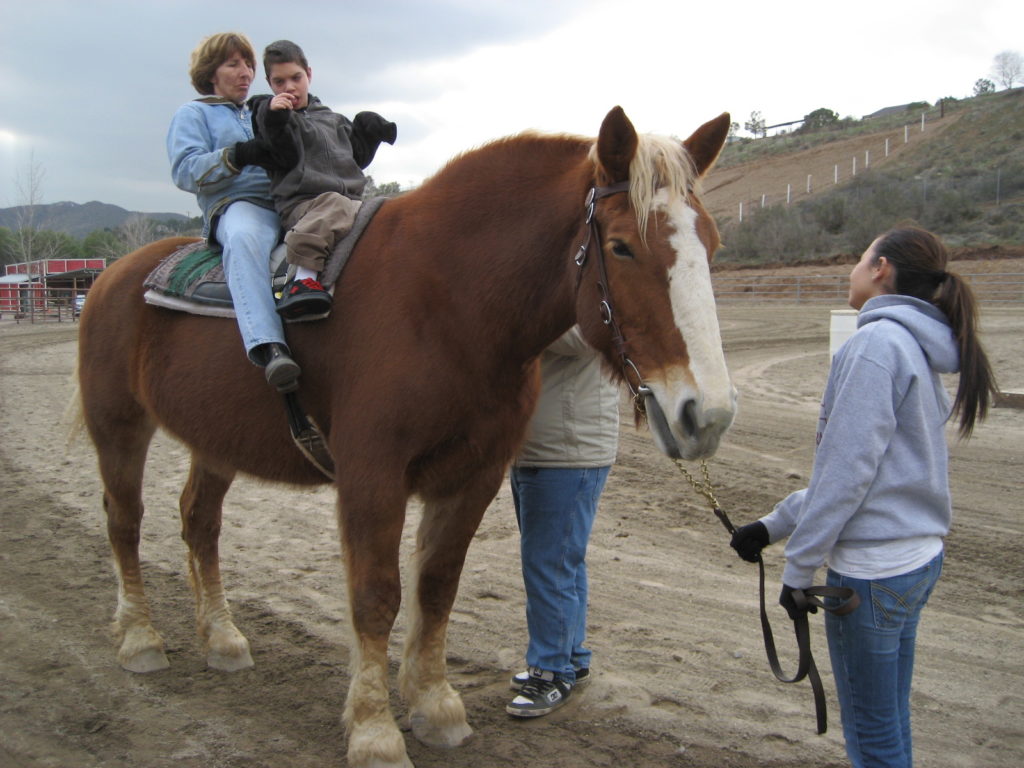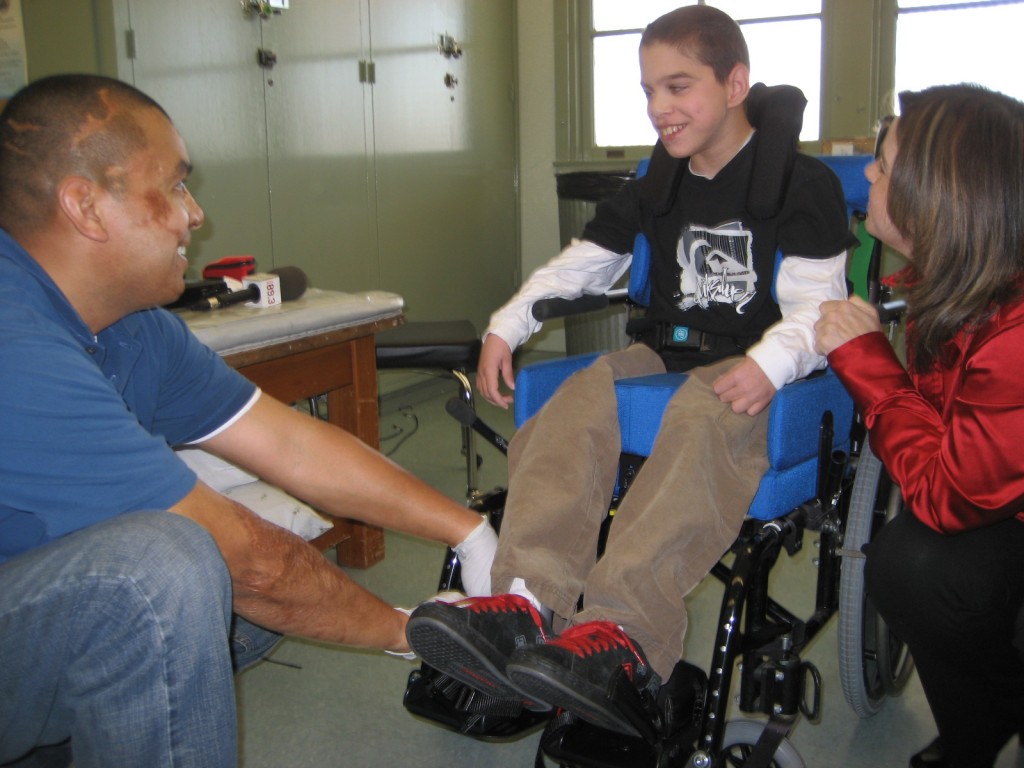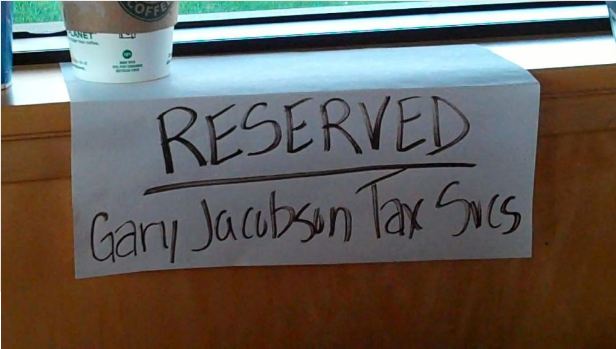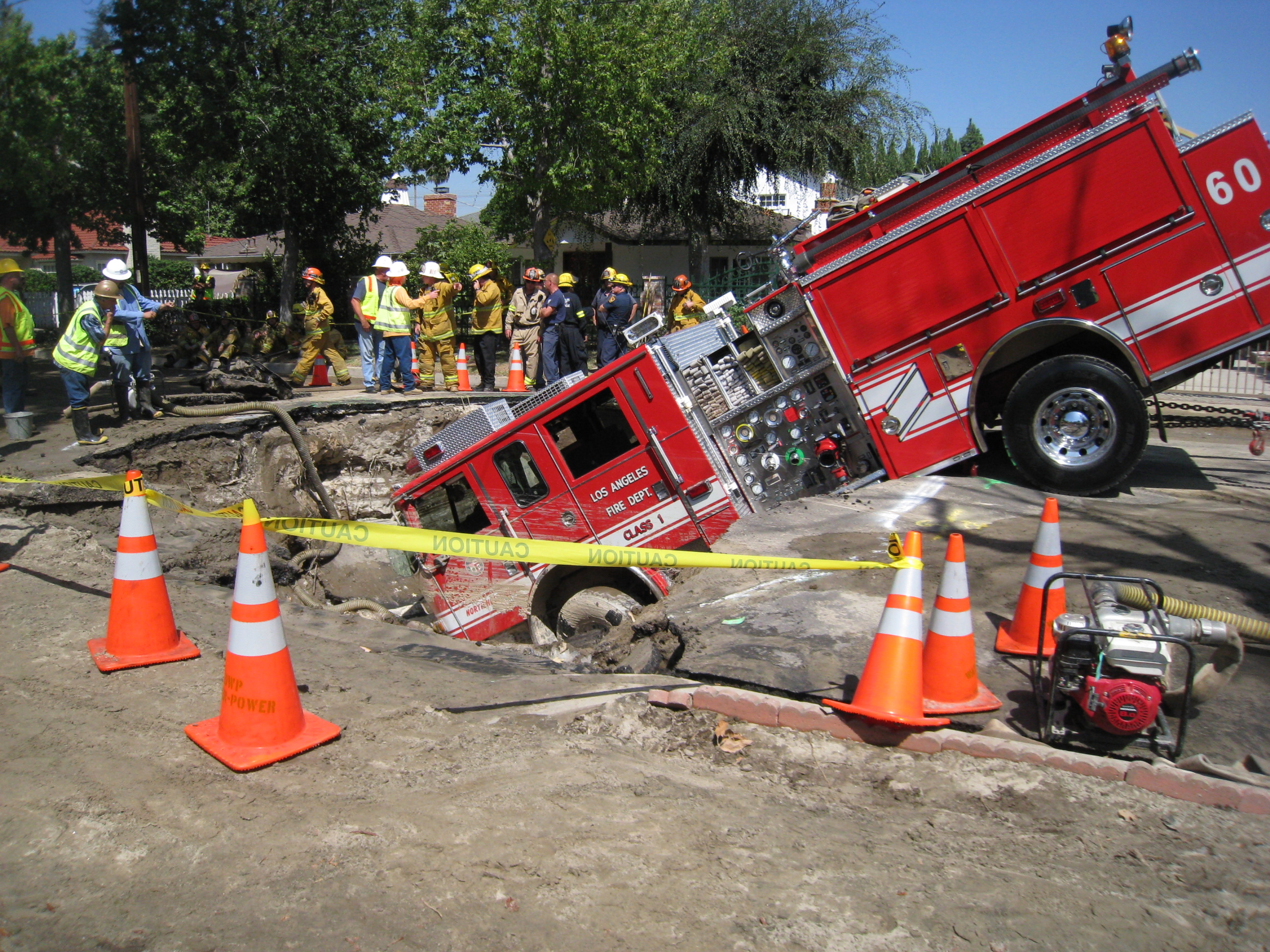Temper tantrums, intense therapy sessions and expensive prescription medications are among the challenges that confront parents with special-needs children. To handle it all, a single mom raising three disabled boys in the San Fernando Valley has tapped several resources. Patricia Nazario explains how she doesn’t spend a red cent of her own money.

Riding instructor Eileen Johnstone helps Daniel Harvey balance himself on Callie. (Photo by Patricia Nazario)
Every Friday, Cathy Harvey takes her 15-year-old son, Daniel, to Carousel Ranch for therapeutic riding lessons. Before she heads north for the 70-mile round trip journey to the Santa Clarita Valley, she swings by Plainview Elementary in the San Fernando Valley to pick up her other two sons early from school.
Dylan, 11-years-old, has high-functioning autism. He’s in the fifth grade.
Dakota, 9, also has autism and attention deficit disorder. He’s a third-grader.
Daniel has Spastic Cerebral Palsy. Doctors diagnosed him when he was seven months old. Not long after, he began taking therapy-riding lessons. Mounting a horse helps Daniel’s strength and balance. Cathy believes it also builds his self-esteem.
“OK, what do you say to your horse?” asked Cathy.
“Go!” exclaimed Daniel.
“That was a great one,” chuckles Daniel’s therapist and riding instructor, Eileen Johnstone. “Right on, dude!”
Daniel sits between Eileen’s legs on Callie, the pretty brown mare.
“Nice and tall,” Eileen reminds Daniel. “Shoulders back. Say Go.”
“Go!” responds Daniel.
An anonymous donor has always sponsored Daniel’s lessons. As Callie walks around the dirt track, Eileen slowly and repetitively stretches Daniel’s arms and legs. Their goals include improving his head control.
“Good keeping your head up,” says Eileen. “Come on.”
“You know what,” yells Daniel’s mom, Cathy, from across the track. “You need to put your head up!”
Cathy constantly calls her son on his posture. Sometimes he’s more responsive, like on another afternoon when the family picked up his newly reconditioned wheelchair. Cathy forgot Daniel’s chinstrap, so she reminded him to keep his head up, while wheelchair specialist Marlon Gomez made custom adjustments. He alternated between tools, screws, and wheelchair parts to meet Cathy’s expectations.
“The blue and the black one’s very sharp!” admired Cathy.
“That material’s a good material, too,” said Marlon.

Cathy Harvey takes her son Daniel to the Lowman Special Education Center in North Hollywood for his wheelchair maintenance. (Photo by Patricia Nazario)
Marlon works at California Children’s Services. Its office is inside the Lowman Special Education Center in North Hollywood. Lowman is among the 17 Los Angeles Unified school campuses for children with severe disabilities. The statewide children’s services program coordinates and covers medical and therapy services for qualifying minors. Daniel Harvey’s Medi-Cal benefits pay his expenses. Cathy depends on it to keep her family’s tight finances afloat.
“They will help you get the special car seats for special children that can’t sit up,” says Cathy. “They will help you get bath seats. Daniel can’t sit in a regular bathtub. He needs to sit in a cradle bath seat. Let’s face it a newborn bath seat wouldn’t hold a 70-pound child.”
Deena Farell is a supervising physical therapist at Lowman. The campus has a designated indoor area, about half the size of a gymnasium, where therapists evaluate children.
“We look at development and we look at function,” says Deena.
She says children’s services treats about 6,000 kids in L.A. County with a range of disabilities.
“Brain tumors,” says Deena. “We have children with cancer, Spinal cord injuries and Cerebral Palsy.”
L.A. Unified also extends its programs to students with visual, hearing, and speech impairments, as well as autism. Federal law mandates that school districts cover the cost of whatever those students need to bridge the gap between their disabilities and their education.
Cathy’s middle son, Dylan, takes an adaptive physical education class at Plainview Elementary. Aside from autism, he has Noonan’s Syndrome. The disease weakens his heart and his stamina is low.
“Right hand, please,” says P.E. teacher Brian Grenham. “Left hand! Stand on one foot!”
Cathy’s youngest son, Dakota also has Noonan Syndrome. L.A. Unified pays behaviorist Colin Marian to work with the third-grader all day. Dakota’s attention deficit disorder and autism fits well with the classroom designed for autistic children at Plainview. Colin focuses on Dakota’s social and academic skills.
“So, what’s 730 look like?” asked Colin and Dakota wrote out the numbers.
“OK,” said Colin.
Dakota’s mom, Cathy, credits Colin with dramatically changing her youngest son’s attitude at school and at home.
“He would literally throw himself on the ground when he didn’t get his way,” she says. “Kick and bite and spit. Just out of control. And as a parent, I did want to give up.”
Now, she gives Dakota kisses when she drops him off in the morning.
“I love you all the way up…” said Cathy.
“…to the moon and back down!” responded Dakota.
“That’s right,” she says. “I love you all the way up to the moon and back down.”
Special-needs children like the Harvey boys qualify for something else under federal law. They have the option of continuing their education until their 22nd birthday. And they start school at age three. Cathy has done her homework to learn all about local and state resources, she says because she wants to open as many doors as possible for her children. But it hasn’t been easy. Cathy remembers packing Daniel’s blue diaper bag the first time she put her firstborn on the yellow school bus.
“And he had to go to school for half the day,” says Cathy. “It was basically taking my baby and putting him in someone else’s hands. And I just bawled.”
WEB RESOURCES:
Carousel Ranch
California Children’s Services
Lowman Special Education Center
State-sponsored medical coverage for children
Noonan Syndrome
Her Three Sons: Part 1 – Home
Her Three Sons: Part 2 – School


